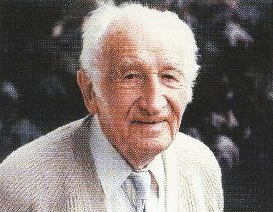Happy 100th Birthday from Your Friends at CDS International in New York!!!
Herbert Krippendorf, born in 1900, went as a work/study student to the U.S. in 1924. His experience in America did not only decisively influence his life, it also gave him the impetus to commit himself to international exchange and thus the foundation of the Carl Duisberg Gesellschaft.
When did you go to America for the first time?
After finishing my studies I went to America in 1924 and worked for Ford in Detroit. To get a job, I boasted a little bit - I had bought a toolbox and claimed to be a toolmaker. This is a lesson I learned from America: you build up a certain self-confidence and learn to adapt yourself. The boss, of course, saw through the story but he gave me the job nonetheless, and I learned a lot.
How did the idea of a student exchange service come about?
Reinhold Schaiar, then the head of the ?Economic Students? Help? in Dresden, had the idea of an American exchange service for work-study students. In the USA, he set up a high-ranking body with representatives of society and industry; the Young Men?s Christian Association (YMCA) provided an office. I was asked to go to New York as its managing director. I stayed there for four years until we had to quit our work because of the world economic crisis.
Who sponsored the work of the American exchange service for students?
Carl Duisberg, the chief executive of Bayer and later the president of the German Chamber of Commerce, became so enthusiastic about the idea that the Chamber co-financed the work of the New York office. He was very interested in foreign contacts and sometimes I had the opportunity to present students to him. Then, the president sat in his chair, was very interested and asked his questions - as a young man I was very impressed by that!
How did your experience in America influence your professional career?
My professional career was very much involved with America; especially for me, an engineer, America was very attractive at the time. The number of pieces produced was much higher than in Germany, manufacturing was different, and I learned a lot. I could pass on my experience within the Association of German Engineers in seminars, workshops and lectures, but also later in my work as the managing director of the Rationalization Committee of German Industry. It was a matter of fact that I continued to update my knowledge; today I still receive the magazine of the Association of American Engineers. And, of course, I learned to be self-confident, to believe in myself - without exaggerating - and to approach new situations openly.
Why did you get involved in the foundation of the Carl Duisberg Gesellschaft?
I had stayed in contact with the 300 former students who had been in America. During one of the alumni meetings, we had the idea to re-establish the student service. We thought it was important to give young people the opportunity to look across borders and to gain experience abroad, because the German people had become very isolated by the war. That was why the Council for International Youth Advancement was founded in Frankfurt in 1949, which was later renamed the Carl Duisberg Gesellschaft. I unfortunately did not take part in the founding session, because I did not have the money to travel to Frankfurt - in 1949 that was a real problem.
Has the Carl Duisberg Gesellschaft met the expectations you had in mind when it was founded?
It has achieved more than I had expected. I am endlessly happy when I see what the Carl Duisberg Gesellschaft has become. Remember how modestly we started! And I believe that in the future the Carl Duisberg Gesellschaft will continue to have an important job to do, because it will be increasingly necessary to learn new languages and to experience new cultures and work environments in the years and decades to come.
Interview by Dorothee Hutter
